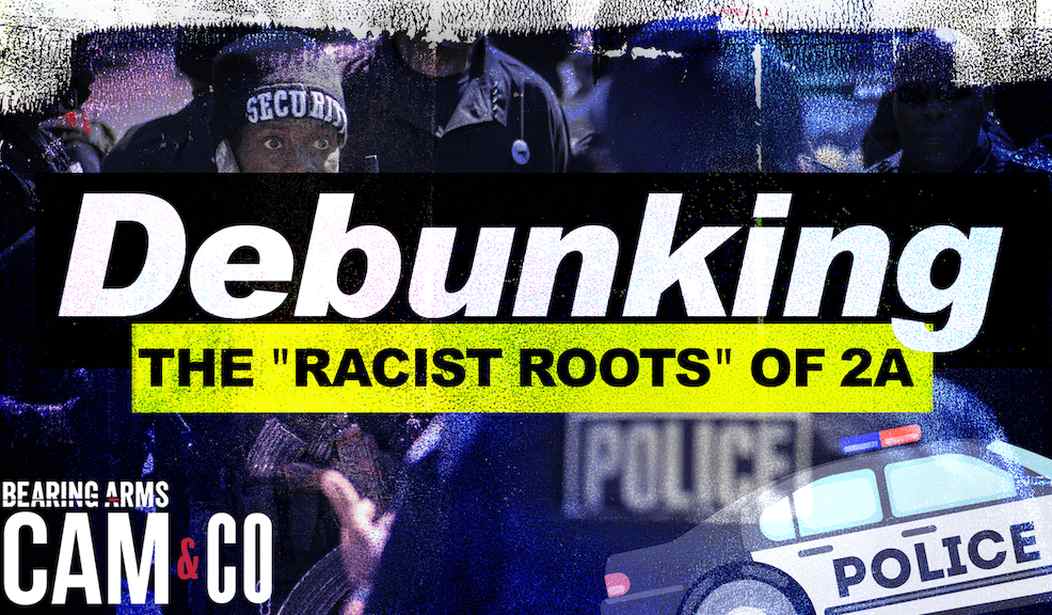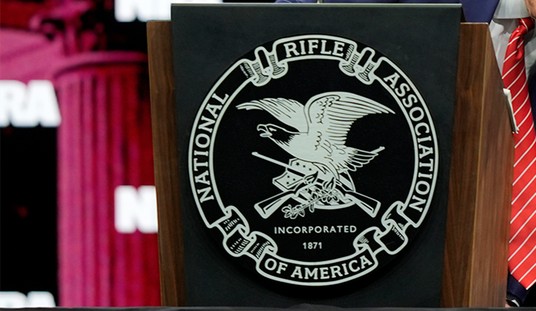Gun control advocates are all about portraying the Second Amendment in the worst light possible, so you can imagine how excited anti-gun journalists must have been when they discovered that a new book was coming out that argues the Second Amendment is only in the Bill of Rights because southern slaveowners wanted to have armed patrols to capture any wayward souls that managed to escape their state of bondage. Historian Carol Anderson actually claims that racism and white supremacy are at the heart of the Second Amendment, and on today’s Bearing Arms’ Cam & Co we have some fun debunking Anderson’s theory.
First, the idea that only southern states were pushing for the protection of the right to bear arms isn’t borne out by history. Even in northern states, analogues to the Second Amendment can be found in state constitutions dating back to 1776. Take Pennsylvania’s language, approved by the state the same year the United States declared independence from Great Britain:
That the people have a right to bear arms for the defence of themselves and the state; and as standing armies in the time of peace are dangerous to liberty, they ought not to be kept up; And that the military should be kept under strict subordination, to, and governed by, the civil power.
Or Kentucky’s 1792 constitution, ratified a year after the Bill of Rights.
That the right of the citizens to bear arms in defense of themselves and the State shall not be questioned.
The language of the Second Amendment is racially neutral. It’s not inherently racist, even if many of those who ratified it were. The People have the right to keep and bear arms. The real trouble has been in getting those in power to recognize Black Americans as part of The People, and that’s where the racist history of gun control laws comes into play.
Laws like New York’s “may issue” carry license and North Carolina’s pistol purchase permit requirement were put on the books specifically to prevent disfavored Americans like recent immigrants and Blacks in the Jim Crow-era South from exercising their Second Amendment rights. The broad discretion afforded to North Carolina sheriffs to determine who was “suitable” to purchase a handgun prevented countless individuals from being able to legally purchase a gun because their sheriff didn’t believe that any Black man or woman was suitable to own a handgun. A single shot hunting rifle, maybe. A Colt 1911 or a Smith & Wesson .38? No way.
Even today, North Carolina’s pistol purchase permit law results in a larger number of Black applicants being denied than their White counterparts. A recent review of the enforcement of the law in Wake County, North Carolina showed that Blacks were almost three times as likely to be denied a purchase permit than White applicants. Author Nicholas Gallo explicitly makes the point that racism and gun control laws have been entwined throughout our nation’s history.
Despite claims to the contrary, the racial (and racist) history of the United States has directly influenced the development of modern gun-control laws. In fact, the U.S. Supreme Court itself in its infamous Scott v. Sanford decision denied citizenship to Black people, in part, because granting citizenship would “give to persons of the negro race . . . full liberty . . . to keep and carry arms wherever they went.” In similar fashion, North Carolina began its journey to disarm Black residents in an act of 1840, under which free men of color were restricted from carrying firearms and from which White men were exempt. Following a constitutional challenge, the Supreme Court of North Carolina upheld the act, finding no constitutional issue since (1) “free people of color cannot be considered as citizens” and (2) it is necessary to “preserve the peace and safety of the community from being disturbed by an indiscriminate use [of firearms] . . . by free men of color.”
Despite these racist gun control laws, there is a strong tradition of gun ownership in Black history, and as I mention on today’s show, there are two books on the subject that should be an essential part of every Second Amendment advocate’s library.
In This Nonviolent Stuff’ll Get You Killed: How Guns Made the Civil Rights Movement Possible, author Charles E. Cobb delivers a compelling history of armed self-defense and the role that it played in shaping the civil rights movement, while Nicholas Johnson’s Negroes and the Gun: The Black Tradition of Arms takes a broader look at Black Americans and the Second Amendment from the Founding until the late 20th century. For those of you who shudder at the thought of reading a dry and dusty history books, I promise that both Cobb and Johnson have written lively books that are full of really fascinating Americans that never showed up in those dull textbooks we had to read in school.
I’ll reserve judgement on Carol Anderson’s entire book until I’ve had a chance to read it, but I feel no need to hold my tongue when it comes to her claim that the Second Amendment is inherently racist. The truth is that the history of the United States is one of broadening recognition of who We The People really are, and it’s been the racists, the bigots, and the paternalistic do-gooders that have imposed gun control laws that have explicitly and implicitly been directed at Blacks, immigrants, and other disfavored Americans.
Even today the gun control movement is demanding more states adopt pistol purchase permit laws, and in North Carolina, Democratic lawmakers cited Everytown for Gun Safety’s support for these laws in their defense of the state’s pistol purchase permit requirement, which Republicans are trying to scrap. The state’s sheriff association, comprised of the very people who enforce the permit requirement, even came out in favor of repeal of the law. Anti-gun activists and Democratic politicians, on the other hand, are still squarely in support of a Jim Crow-era regulation that was designed to keep Blacks from exercising their right of armed self-defense. If there’s any doubt about which side of the gun control debate is truly interested in ensuring that The People can equally exercise our Second Amendment rights, what’s happening in North Carolina right now should clear up any confusion.









Join the conversation as a VIP Member